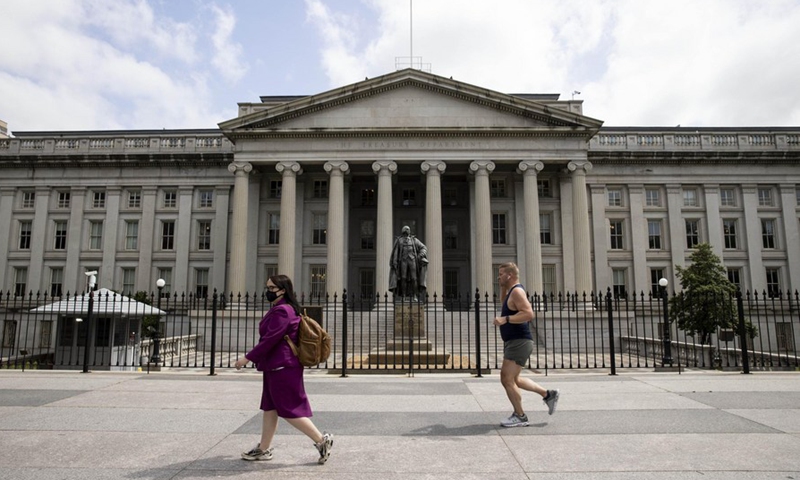China cuts US Treasury holdings to lowest in nearly 12 years amid volatility in the US

People walk past the US Treasury Department building in Washington, D.C., the United States, May 21, 2020. (Photo by Ting Shen/Xinhua)
China trimmed its holdings of US Treasury bonds for a fourth straight month in March by more than $15.2 billion, taking the total holdings to the lowest level since June 2010, in what experts said was a move to reduce losses as Treasury bond prices slid and help diversify China's foreign exchange holdings in the long run.China may continue to reduce its holdings of US Treasury debt if the US' high inflation persists, its drastic monetary tightening continues and the US' economic outlook deteriorates, experts said, calling for restructuring overseas assets and diversifying foreign exchange reserves to fend of risks.
According to data from the US Treasury Department on Monday, China's holdings of US Treasury bonds dropped to $1.039 trillion at the end of March, down $15.2 billion from the previous month.
China remained the second-largest non-US holder of Treasury bonds after Japan, which had $1.232 trillion at the end of March.
The reduction was a market-based decision, Zhou Maohua, a macroeconomic analyst at Everbright Bank, said on Tuesday, noting that when the US bond market fluctuates violently, foreign investors tend to sell US Treasury bonds.
"The plunge of US Treasury prices, mounting US inflation pressure and aggressive US interest rate hikes were the main causes," Zhou told the Global Times.
It is expected that China's moderate reduction will help reduce losses in the short term and diversify and stabilize China's foreign exchange holdings in the long run, Zhou said.
Compared with other foreign holders of US debts, China's reduction was moderate. In comparison, Japan trimmed $73.9 billion of US Treasury bonds in March, the largest drop among foreign holders, which experts said is a desperate move to shore up the yen's decline against the US dollar.
Global centrals banks are cutting their US dollar reserves, and rising unilateralism, trade protectionism and geopolitical conflicts have accelerated this trend in recent years, putting the US dollar's global hegemony at risk, Zhou said.
The reduction in China's holdings underscored that the country's resistance to the hegemony of the US dollar as a reserve currency has strengthened, Tian Yun, former vice director of the Beijing Economic Operation Association, told the Global Times on Tuesday.
Tian said that in the short run, China may continue to buy US Treasury bonds, given there are few other better options for China to invest its vast foreign exchange reserve assets, but it should accelerate foreign exchange restructuring in the long run.
Tian suggested that China should increase its gold reserves, anchor the yuan to critical resource exports like rare earths, and increase the amount of yuan settlement and yuan pricing power when importing resources from other nations.
Similar comments were made by Yu Yongding, a prominent economist at the Chinese Academy of Social Sciences, during the Tsinghua PBCSF Chief Economists Forum on Saturday.
Yu suggested that authorities reduce holdings of US Treasury bonds and increase holdings of other forms of assets, increase investments in strategic resource-producing countries, and strictly protect foreign investors in China, while calling attention to the security of China's massive US dollar-denominated assets.
For the US, if foreign investors continue dumping US Treasury debt, it will increase the cost of borrowing for the US government, push up the financing cost of US consumers and enterprises, and weaken the prospects of an economic recovery, Zhou said.
Meanwhile, Chinese banks had a surplus of $19 billion in foreign exchange settlements in April, equal to the monthly average in the first quarter and much higher than the same period in 2021, according to data from the State Administration of Foreign Exchange (SAFE) on Tuesday.
The fundamentals of China's long-term economic growth remain unchanged, and the impact of the COVID-19 epidemic on the domestic economy will be short-lived and contained, said Wang Chunying, a spokesperson for the SAFE.
China's foreign exchange market has become more mature and resilient, and it has a better foundation and favorable conditions to adapt to changes in the external environment, Wang said.
The yuan lost around 3.8 per cent against the US dollar in April but remained robust compared with performances of major global currencies. The yen declined 6.2 percent against the dollar, while the euro was down 4.7 percent and the British pound fell 4.35 percent in April.
